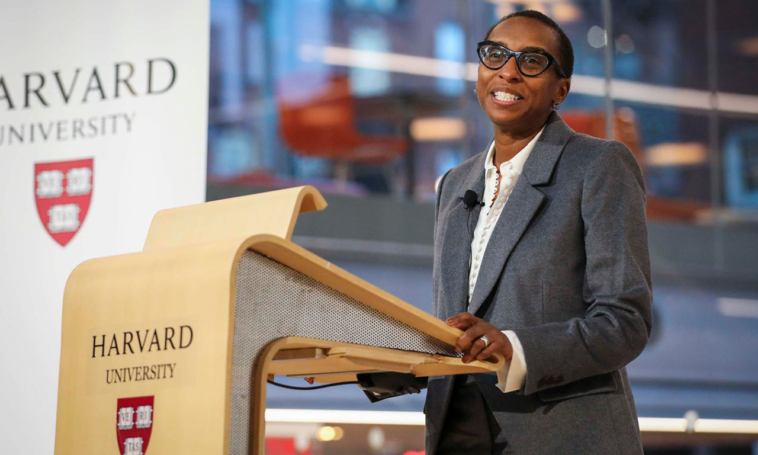Pressure grows on Harvard President Claudine Gay after Penn’s Liz resigned. The resignation of University of Pennsylvania’s president, Liz Magill, has shifted attention to Claudine Gay, her counterpart at Harvard University.
A congressional hearing on alleged antisemitism incidents involving Harvard, Penn, and MIT presidents drew criticism, with Republican Rep. Elise Stefanik expressing dissatisfaction and calling for their removal.
Pressure grows on Harvard President Claudine Gay after Penn’s Liz resigned. Reports say “The leaders’ testimony, failing to explicitly condemn calls for the genocide of Jews, led to bipartisan calls for their removal, while faculty members and major donors had divergent opinions.”
Stefanik, serving on the House Committee on Education and the Workforce, played a significant role in bringing attention to the issue. She expressed dissatisfaction with Gay’s responses during the hearing, particularly regarding the violation of Harvard’s code of conduct about antisemitism.
Stefanik’s tweet, “One down. Two to go,” referred to Magill’s resignation and indicated a desire for the removal of Gay and MIT President Sally Kornbluth.
Harvard, Penn, and MIT faced increased scrutiny after the Israel-Hamas war, with allegations of antisemitism on their campuses.
A bipartisan group of lawmakers sent a letter urging the removal of university leaders, while faculty members supported Gay through a petition.
The situation escalated as major donors, including billionaire hedge fund CEO Bill Ackman, criticized Gay for perceived failures in enforcing Harvard’s rules.
Ackman’s open letter highlighted concerns about the safety of Jewish students at Harvard, citing Gay’s alleged failure to condemn terrorism and enforce conduct rules.
Despite Gay’s subsequent apology, acknowledging her lapse in judgment during the hearing, major donors like Ackman remained unswayed, questioning her academic integrity and values.
Harvard, among 14 colleges under investigation by the Department of Education for discrimination involving shared ancestry, faces challenges in addressing antisemitism and Islamophobia on campus.
Gay, a political scientist and the first Black woman to lead Harvard assumed the presidency in July and faced immediate challenges related to the Israel-Hamas conflict.
Unlike Magill, who had been under fire for months, Gay’s acknowledgment of Jewish students’ concerns and efforts to address antisemitism on campus did not shield her from criticism.
A coalition of student groups blamed Hamas for the attacks on Israel, drawing condemnation from business leaders and alumni. Gay later condemned the “terrorist atrocities perpetrated by Hamas” and asserted that no student group speaks for Harvard’s leadership.
In late October, Gay announced the formation of an advisory group comprising faculty, staff, alumni, and religious leaders to address antisemitism on campus comprehensively.
However, despite these initiatives, criticism persisted, raising questions about the effectiveness of these measures.
The Harvard Corporation and the Board of Overseers, Harvard’s governing bodies, faced increased pressure as they convened to discuss Gay’s position. The outcome of the meeting remained uncertain, and Harvard declined to comment on the ongoing situation.
The community backlash against Gay took various forms, with business leaders and alumni criticizing her perceived inaction in combating antisemitism.
Bill Ackman, in his open letter, accused Gay of catalyzing an explosion of antisemitism and hate on campus, emphasizing her alleged failure to condemn terrorism and enforce university rules.
Ackman questioned whether Harvard would have considered Gay for the position, given the current circumstances. This sentiment echoed broader concerns among alumni donors, with over 1,800 signatories urging concrete reforms to support Jews on campus.
The faculty’s response to the situation revealed a divided opinion within the Harvard community. Over 300 faculty members signed a petition supporting Gay, emphasizing the university’s commitment to academic freedom.
Rabbi David Wolpe, resigning from Harvard’s antisemitism advisory group, highlighted the systemic nature of the issue, suggesting that combating ideologies at Harvard requires more than the removal of a single individual.
Individual faculty members took to social media to express support for Gay, emphasizing the systemic nature of discrimination on campus.
The complex dynamics at play within Harvard’s community reflect broader challenges faced by academic institutions in addressing sensitive issues like antisemitism.
The ongoing situation underscores the delicate balance between academic freedom, community expectations, and the responsibility of university leaders to create inclusive and safe environments for all students.
The outcome of Harvard’s internal discussions will likely shape the future approach of academic institutions in dealing with such complex and sensitive matters.



Join the Community and Be a Part of the Conversation
You must be logged in or registered to post a comment.